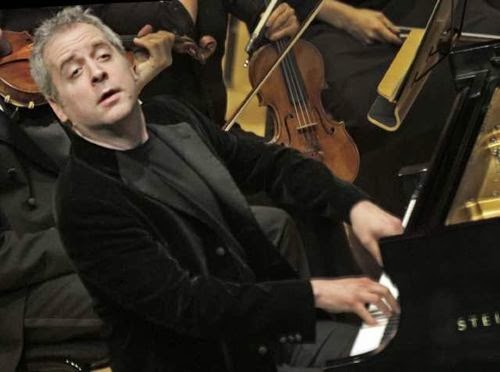A MacArthur Foundation 'genius' plays the Twin Cities in Mozart and Brahms
Jeremy Denk, who presents himself onstage in a charmingly offhand way — kind of an "anti-maestro," is nonetheless a pianist of almost alarming focus and intense engagement with whatever he's playing. He seems so secure coming at music from within that he easily jettisons a major concert artist's stereotypical need to impress audiences with his "ownership" of the repertoire at hand.
I had heard him in concert just twice before catching a Saint Paul Chamber Orchestra program this past Thanksgiving weekend in St. Paul's well-designed Ordway Hall. As a recital partner with Joshua Bell, he gave immense stature to the violin-centered program I attended in Alice Tully Hall several years ago. And in April 2011, the Indianapolis Symphony Orchestra brought him to the Hilbert Circle Theatre for a performance of Mozart's Piano Concerto No. 21 in C major, K. 467.
Like many music-lovers, I have found his "Think Denk" blog worth a permanent place on my short list of classical-music blogs frequently consulted. His writing about music is one of the pillars of his reputation; it doubtless played a role in the MacArthur Foundation "genius grant" he received earlier this year.
Speaking of Mozart (and how often do music-lovers converse without eventually speaking of Mozart?), Denk performed another Mozart concerto in C major in St. Paul. No. 25 (K. 503) is less superficially a charmer than K. 467, perhaps, though it's just as strong imaginatively. I won't dissent absolutely from this assessment of it by the English writer Hyatt King (in "The Concerto," an essay anthology in a Pelican Original series of many years ago): "Despite the sparkle of the finale, the whole has a certain statuesque quality and an unimpassioned aloofness which have prevented it from winning wide popularity."
Denk discarded the "unimpassioned aloofness" label with aplomb, however. Seated at the keyboard facing the orchestra, he did not so much as conduct from the piano as impart an interpretation through body language. In the solo part, Denk had a way of finding something meaningful in every note, without overloading or distending any passage along the way. It was direct, unfussy music-making that readily avoided blandness. And, after he pointed out the score's piquant major-minor ambiguity in brief oral program notes beforehand, you heard it demonstrated in performance without an overlay of pedantry. Compositional ingenuity, in Denk's hands, always seems to be an "open sesame" to its embodiment in genuine excitement.
His encore, the Andante movement from the F major Sonata, K. 533, allowed Denk to extend the excitement with a piece that could be said to represent Mozart's avant-garde side. The movement, the pianist noted, features major-minor ambivalence "on steroids," allowing for an enhanced bittersweet quality that Denk expertly displayed.
The program's first half featured the pianist in a performance of Brahms' Piano Quintet in F minor, op. 34, a large-spirited, vigorous work in four movements splendidly played with the help of three Saint Paul Chamber Orchestra principals (Steven Copes and Ruggero Allifranchini, violins; Maiya Papach, viola) plus cellist Peter Wiley. Once again, Denk showed himself to be a sensitive collaborator, technically adroit and urgent as needed but, more important, also able to help his able colleagues shape the slow movement's pervasive delicacy.
I had heard him in concert just twice before catching a Saint Paul Chamber Orchestra program this past Thanksgiving weekend in St. Paul's well-designed Ordway Hall. As a recital partner with Joshua Bell, he gave immense stature to the violin-centered program I attended in Alice Tully Hall several years ago. And in April 2011, the Indianapolis Symphony Orchestra brought him to the Hilbert Circle Theatre for a performance of Mozart's Piano Concerto No. 21 in C major, K. 467.
Like many music-lovers, I have found his "Think Denk" blog worth a permanent place on my short list of classical-music blogs frequently consulted. His writing about music is one of the pillars of his reputation; it doubtless played a role in the MacArthur Foundation "genius grant" he received earlier this year.
 |
| Jeremy Denk always seems to know how to match concept and execution. |
Denk discarded the "unimpassioned aloofness" label with aplomb, however. Seated at the keyboard facing the orchestra, he did not so much as conduct from the piano as impart an interpretation through body language. In the solo part, Denk had a way of finding something meaningful in every note, without overloading or distending any passage along the way. It was direct, unfussy music-making that readily avoided blandness. And, after he pointed out the score's piquant major-minor ambiguity in brief oral program notes beforehand, you heard it demonstrated in performance without an overlay of pedantry. Compositional ingenuity, in Denk's hands, always seems to be an "open sesame" to its embodiment in genuine excitement.
His encore, the Andante movement from the F major Sonata, K. 533, allowed Denk to extend the excitement with a piece that could be said to represent Mozart's avant-garde side. The movement, the pianist noted, features major-minor ambivalence "on steroids," allowing for an enhanced bittersweet quality that Denk expertly displayed.
The program's first half featured the pianist in a performance of Brahms' Piano Quintet in F minor, op. 34, a large-spirited, vigorous work in four movements splendidly played with the help of three Saint Paul Chamber Orchestra principals (Steven Copes and Ruggero Allifranchini, violins; Maiya Papach, viola) plus cellist Peter Wiley. Once again, Denk showed himself to be a sensitive collaborator, technically adroit and urgent as needed but, more important, also able to help his able colleagues shape the slow movement's pervasive delicacy.



Comments
Post a Comment